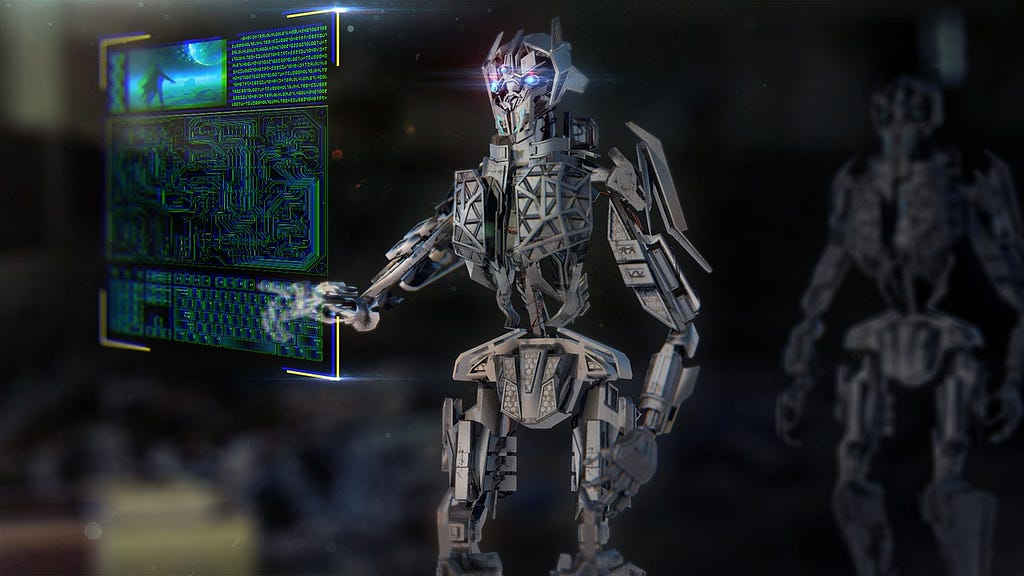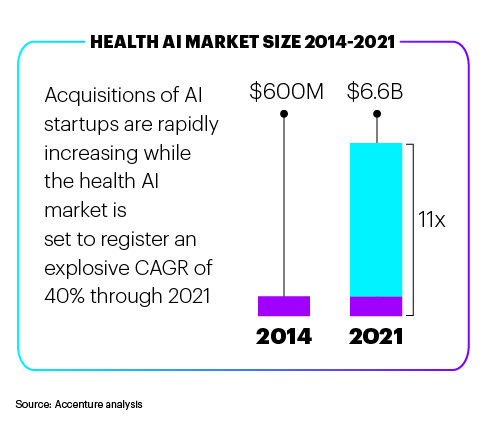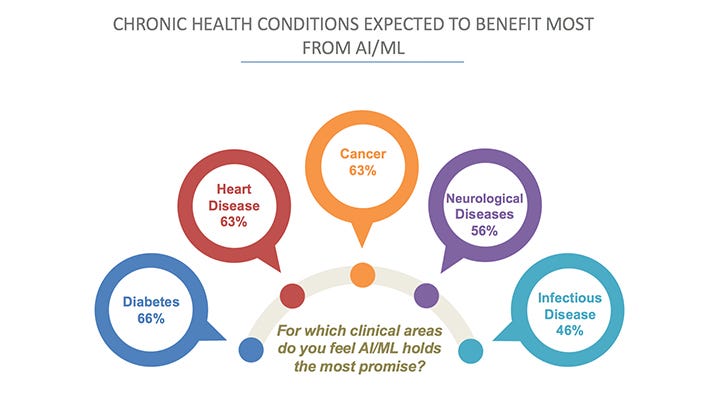Latest news about Bitcoin and all cryptocurrencies. Your daily crypto news habit.

The power of Artificial Intelligence is echoing across many industries. But its impact on healthcare is truly life-changing. With its ability to mimic human cognitive functions, AI is bringing a paradigm shift in the healthcare industry.
This transformative technology is revolutionizing the health sectors in many ways. From drug development to clinical research, AI has helped improve patient outcomes at reduced costs. Besides, the introduction of this technology in healthcare promises easy access, affordability, and effectiveness.
For the same reasons, there has been a huge investment by public and private sectors in the healthcare industry. According to a study, the investment will reach $6.6 billion by 2021. Accenture’s reports are even more astonishing. According to their analysis, AI applications can create annual savings of $150 billion by 2026 for US healthcare.
Big Data & AI in Healthcare
Recent advancements in AI have fueled discussion of whether AI doctors will replace human doctors in the future. While the idea of replacing human doctors may sound absurd, but AI can help human physicians to make better decisions. In certain areas of healthcare like radiology, it can replace human judgment entirely.
Big Data has made successful applications of Artificial Intelligence in healthcare. There has been a rapid development in big data analytic methods, and so much healthcare data is available. Using this data, a lot of clinically relevant information hidden in a large amount of data can be unlocked by powerful AI techniques. This will help in making better clinical decisions.
Motivation
The ability of AI to use sophisticated algorithms and learn features from a massive amount of data is truly commendable. With the help of these algorithms, insights for assisting clinical practice can be obtained. AI can be equipped with self-correcting and learning abilities which help the system get better accuracy based on the feedback it receives.
Therefore, it gets better with time. These AI systems can help physicians in many ways. Since they are armed with a lot of information, they can assist in clinical decision making. Also, diagnostic errors and therapeutic errors can be minimized.
Besides, AI systems have access to large volumes of data; they can make predictions about potential health risks by extracting useful information.
But do we really need it?
AI is big and powerful. We cannot question its effectiveness. It is going to have a huge impact on the healthcare industry. Facts listed below tell us why:
- Hospital error is one of the leading causes of patients’ death. Such errors can be addressed and prevented by Artificial Intelligence.
- Nearly 440,000 Americans die each year due to medical errors which can be easily prevented by AI.
- In the healthcare industry, nearly 86% of the mistakes are preventable.
- In the next 5 years, AI health market will grow by more than 10 percent.
Applications Of Artificial Intelligence
Artificial is changing the healthcare industry for better. From early detection to improved diagnosis, AI is positively contributing to the betterment of humanity. In some areas, it is already being used, and there are areas where we can see the introduction of AI in the coming time. In specialty care including pharma, radiology, and pathology, AI is delivering high value.
Chronic health conditions are expected to benefit the most from AI systems. Cancer, diabetes, heart diseases are big opportunities for healthcare trends such as pop culture and precision medicines.
Here are a few ways in which AI is (or will) changing the healthcare industry:
Personal Health Virtual Assistant
In the present era, most people have access to a smartphone. They are likely to have their virtual assistant on their mobile devices. Advanced AI algorithms power assistants like Cortana, Google Assistant, Siri. When combined with healthcare apps, they will provide massive value to the users.
Healthcare apps will act as a personal health assistant. They will also be used to provide medication alerts, and human-like interactions will also be possible. AI as a personal assistant will also help in assisting the patients when the clinical personnel is not available.
AI Improves The Quality Of Sleep
It has been proved that night of good night sleep is very important for better physical and mental health. People who get sound sleep at night are happier, healthier, and more productive during the day.
There are a lot of effective sleep gadgets in the market that help you sleep better at nights. From AI-powered smart mattresses to baby monitors, sleep apps, AI technology is continually working to improve the overall quality of sleep.
A healthcare company named AXA PPP created two lullabies; one by AI and other by humans. With deep learning, the AI system could get a feel for rhythm and harmony resulting in a new composition. This composition was then converted into a song with the help of a human, and it can help you sleep better.
Medical Imaging Analysis
Another important field in healthcare which is using AI is radiology. AI systems can help with diagnostic processes. It can examine medical images like X-rays, CT scans, MRIs, etc. and can provide feedback on what it thinks a human eye can miss.
Thus, medical imaging analysis becomes much more accurate and effective. It reduces the chances of errors.
IBM Watson is a live example. In the field of oncology, it can provide clinicians with evidence-based treatment options for the cancer patients based on the training provided by Memorial Sloan Kettering (MSK) physicians.
Precision Medicine
Genomic is the branch of molecular biology which deals with the structure, evolution, function, and mapping of genomes. It looks for the links to disease from the information obtained from the DNA.
When combined with AI, it is possible to spot cancer and some vascular diseases at a very early stage. Moreover, it can predict the health issues the patients might face based on their genes.
Healthcare Bots
AI technology is also gaining traction in the customer service domain. The world is likely to see healthcare bots very soon. Patients will be able to interact with these AI bots on the website through a chat window or via telephone.
Healthcare bots will be used to schedule appointments with the patient’s healthcare provider. These bots can help patients with their medication as well. They can also improve customer service by offering 24 x 7 support.
These are some of the great things that AI can do. But it is not limited to that. As innovation pushes the boundaries of healthcare, better solutions to save time, money, and efficiency will be possible.
How AI Is Transforming The Future Of Healthcare Industry was originally published in Hacker Noon on Medium, where people are continuing the conversation by highlighting and responding to this story.
Disclaimer
The views and opinions expressed in this article are solely those of the authors and do not reflect the views of Bitcoin Insider. Every investment and trading move involves risk - this is especially true for cryptocurrencies given their volatility. We strongly advise our readers to conduct their own research when making a decision.

